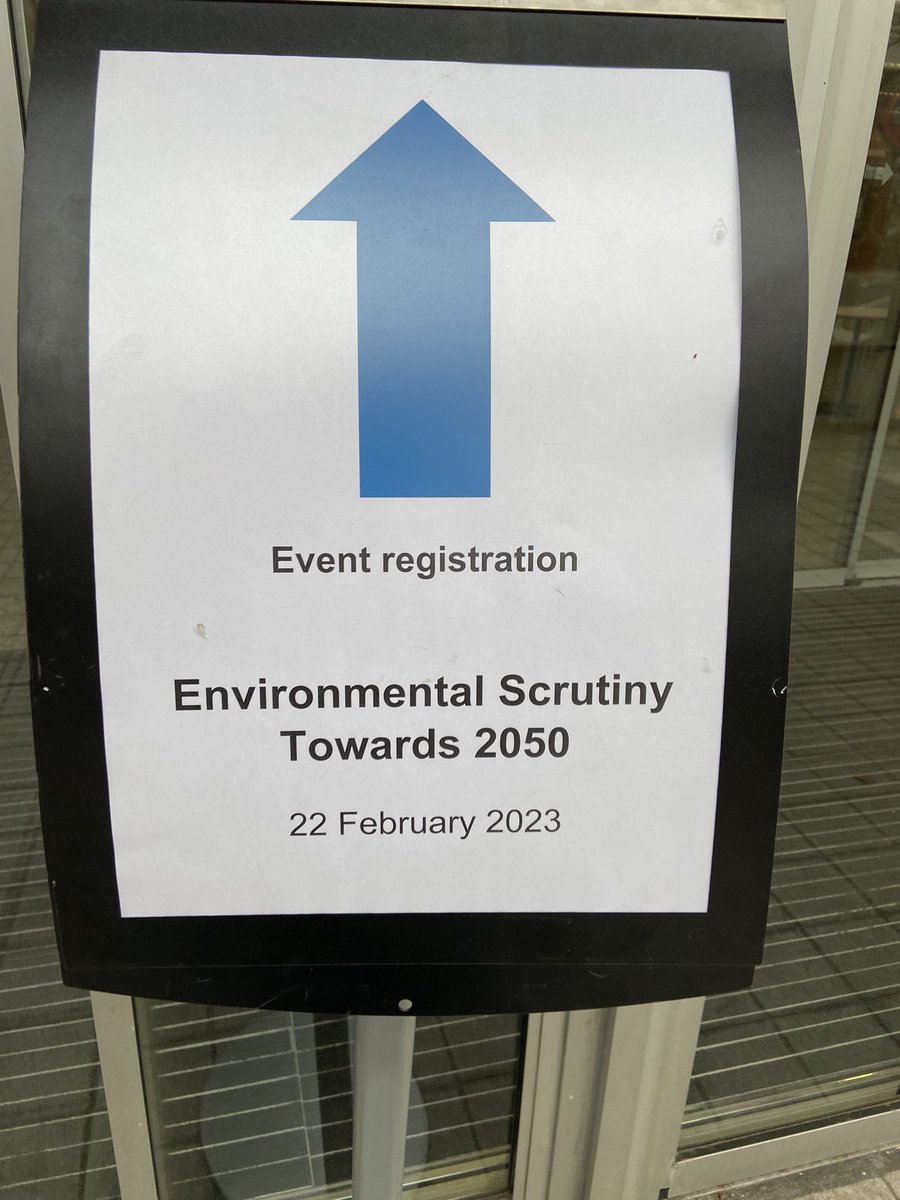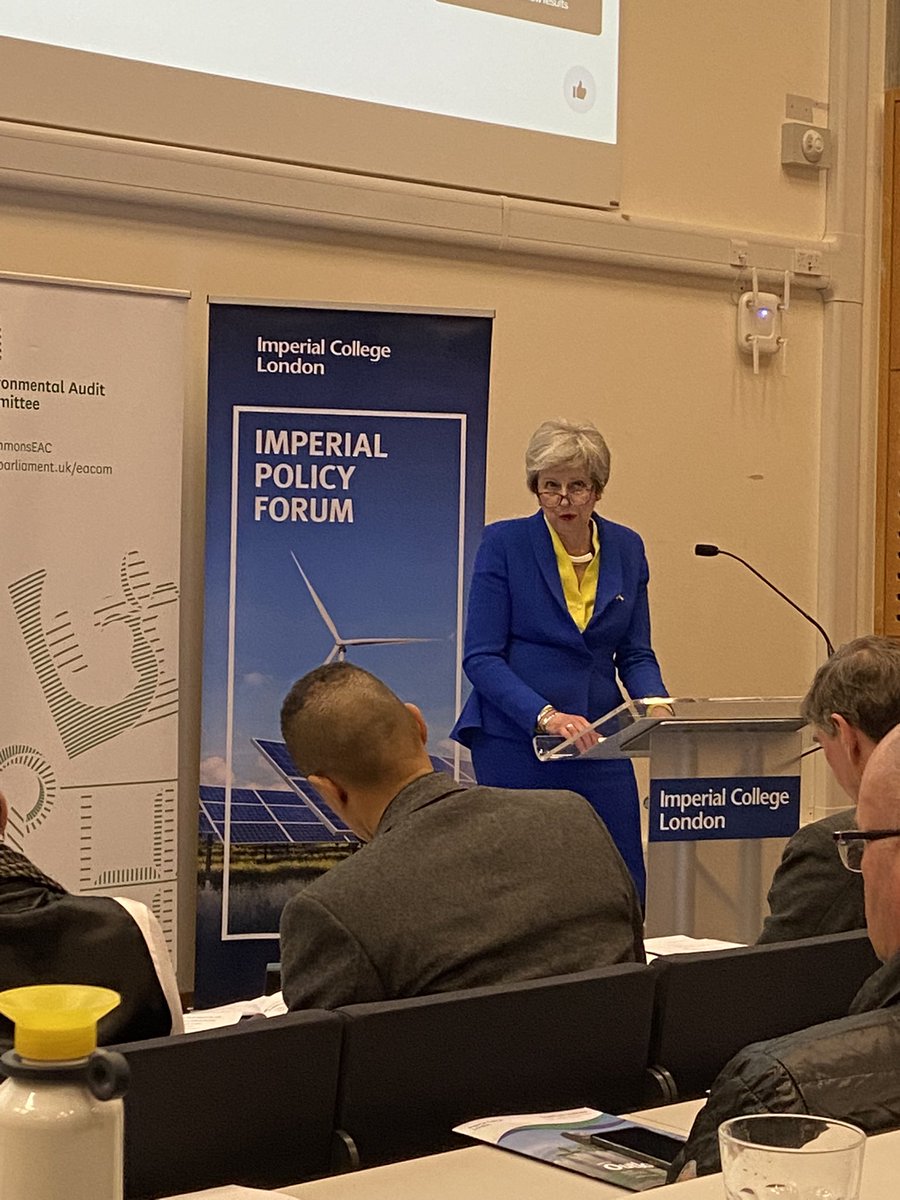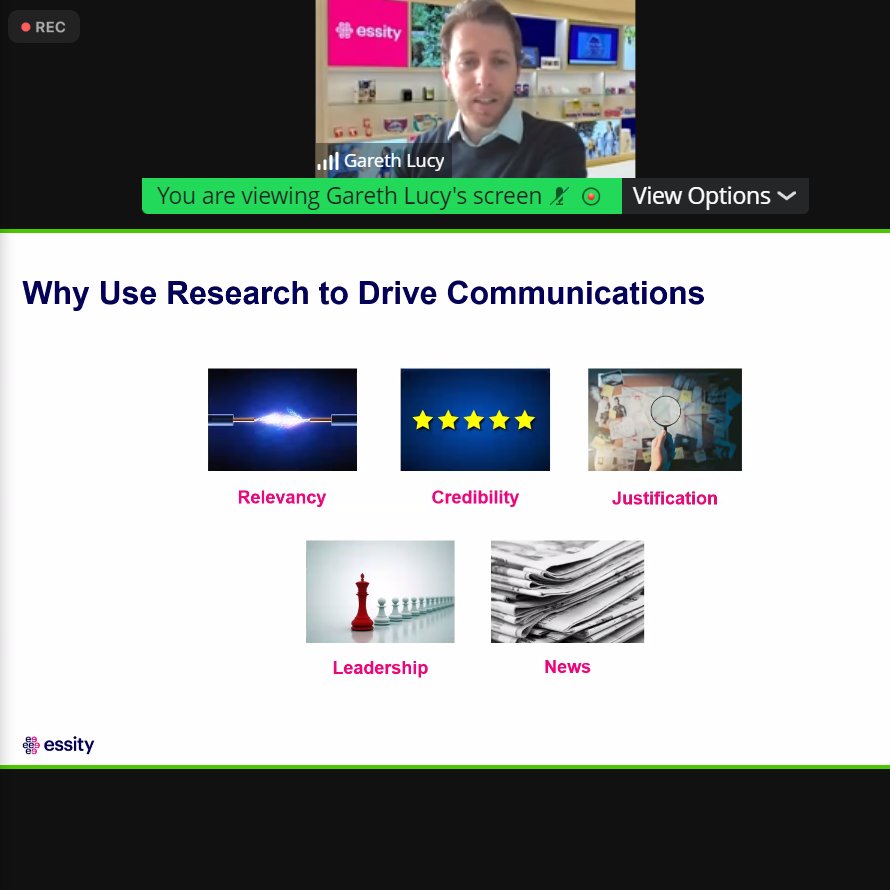
Looking forward to what should be a very interesting event celebrating 25 years of @CommonsEAC & looking forward to the next 25 years #EAC25Event 



First Prof Hugh Brady opens the event by giving a potted history of @imperialcollege’s activities in research & innovation & an incubator for UK cleantech #EAC25Event
Brady also discusses the challenges & opportunities presented by the 🇺🇸 Inflation Reduction Act, which will turbocharge R&I, but 🇬🇧 runs the risk of being left behind. Also highlights benefits of funding & partnership of 🇪🇺 schemes #EAC25Event
Finally, Brady says delegates should view the university as a resource to help their organisations to achieve the policies & innovations needed to reduce carbon, increase resilience & contribute to rejuvenating biodiversity #EAC25Event
Next speaker @Dunne4Ludlow welcomes the fact that the Committee’s 25 anniversary coincides with the university’s #BiodiversityWeek. He notes the “long and consistent partnership” between EAC & Imperial #EAC25Event
Dunne then gives an overview of the history of the EAC, which was created following the Blair Govt’s manifesto commitment for cross-departmental scrutiny of environmental policy #EAC25Event
Dunne also notes that, compared to other Select Committees, EAC is “less adversarial than those that mirror a Ministry. Believes this is because it is “cross party & wants to do the right thing” #EAC25Event
Next, Dunne gives an overview of the work of the Committee, including deep dives into various departments & being entitled to gain written responses from Ministers to letters #EAC25Event
On the impact of the Committee, Dunne acknowledges that EAC has a “lower hit rate” in terms of Govt accepting recommendations. However he argues this is in part due to the fact “the environment does not acknowledge administrative boundaries” #EAC25Event
On targets, Dunne welcomes the recently published EIP, but believes it is the May Premiership that will be recognised for putting Net Zero at the 💖 of policymaking #EAC25Event
Now @theresa_may delivers the keynote speech. Welcomes the fact that the EAC has “made breakthroughs in a Westminster machine designed to operate in silos” #EAC25Event 

May argues that even climate skeptics should want to “preserve our natural environment” & calls for the work to continue to build consensus & “bring people with us” rather than “nag them into action” #EAC25Event
May then highlights how it is vital for Whitehall to mainstream #NetZero across all its policies (eg DfE greening school campuses, but also ensuring skills policy provides green skills needed) as well as between departments (eg skills contributing to Levelling Up) #EAC25Event
Looking to the future, May says that “now is the time for delivery” & that Parliament has a role to play in ensuring Govt delivers. Argues EAC has a “unique role” to play in ensuring “joined-up govt” on delivering Net Zero #EAC25Event
May cites 🇺🇳 report saying that Govt actions on Net Zero “fall far short” of 2050 targets & how COP26 strengthened ambitions. Stresses UK has an opportunity to align Net Zero with tackling the cost of living crisis #EAC25Event
May welcomes Skidmore’s recommendations that green growth will be the industrial Revolution on 21st century. Notes UK has a competitive advantage on green tech & believes EAC has a “unique role” to help Govt create the right private & public investments to deliver #EAC25Event
May concludes saying that she believes that the EAC has remained an “unsung but vital” select committee and saying she looks forward to seeing their achievements unfold over the next 25 years #EAC25Event
Next the session moves on to a panel discussion. @MaryCreagh_ believes the Committee “suffers from its name”, with people thinking “audit” sounds “boring”, but in fact environmental scrutiny is an important role #EAC25Event 

However, Creagh argues EAC “would need to be invented if it didn’t already exist”. By taking a cross-departmental look at environment, the EAC provides a platform for policymakers & public to scrutinise policy & provide solutions #EAC25Event
.@DavidShukman says that the EAC helps shape the media narrative, noting “colourful language” of some reports such as going on a “war footing” on leaky homes #EAC25Event
Shukman also says EAC inquiries provide specialist publications with topics for deep dive editorials & provide lobby press with subjects to hold Ministers to account on (eg water quality) #EAC25Event
Now @imperialcollege’s Prof Mary Ryan discusses how universities can inform the work of Parliamentarians. Says a “lack of joined-up thinking” across policies limits policy ambitions (eg lithium for EVs negatively impacting net zero due to mining impact) #EAC25Event
Ryan says that policy can either “be led by or drive” innovation. Gives the example of the circular economy as the way of changing debate on waste & unlocking innovation in reuse & recycling #EAC25Event
On how to improve interactions with MPs, Ryan argues academics need to work more on “embedding” MPs & civil servants into Uni ecosystems, rather that the current “Q&A relationship” #EAC25Event
Turning to opportunities & challenges, @DrHannahWhite says EAC’s biggest strength & weakness is that it is a cross-departmental committee. Says #Brexit shows how, historically, MPs & Ministers struggle with cross-departmental issues #EAC25Event
White believes the fact Dunne is a Conservative MP has helped the EAC’s access to Ministers and to understand “what bit of their portfolio” is being scrutinised #EAC25Event
On whether the new Energy Security & Net Zero Dept’s committee will lead to “duplication of effort”, White says “No”. Believes it will be similar to when DECC existed. Believes EAC’s strength is that it can be a convenor as well as scrutiniser #EAC25Event
White also suggests that EAC could hold Chairs of other Select Committees to account to ensure they are sufficiently taking Net Zero into account. Dunne says that is an “interesting challenge” #EAC25Committee
Creagh also highlights the Super Committee inquiry into air pollution and the EAC’s five year reviews of keystone policies as demonstrating the longevity of the Committee’s scrutiny of govt actions #EAC25Committee
White agrees, says that there is evidence that when Select Committee’s work together, it encourages Ministers and civil servants to work more closely together #EAC25Event
The panel now moves on to a Q&A session #EAC25Event
When asked to name a specific change in legislation due to an EAC recommendation, Dunne cites the toughening of storm overflow durations as a direct response to the EAC’s report on the #Water sector #EAC25Event
On green financing, panelists agree that there is still a lack of education amongst investors & policymakers on complexity of modelling & improving transparency of supply chains #EAC25Event
On a Q on public engagement, Dunne says the most effective way is to respond to public consultations. While he welcomes submission from “the usual suspects”, the committee also welcomes anecdotal evidence as well as more professional response #EAC25Event
Dunne asks Shukman how media can report more on evidence submitted, Shukman replies saying Committee needs to consider how to share data more on social media #EAC25Event
White says EAC (& Parliament as a whole) needs to look at how evidence is gathered, to ensure that the process is more inclusive for more people #EAC25Event
On how to improve access to Govt Ministers, Dunne welcomes the suggestion that EAC Chair should always be a Govt MP. Notes the precedent of @CommonsPAC Chair is always an Opposition MP #EAC25Event
Creagh says the EAC needs to be prouder of its alumni - notes that a majority of past EAC members have ended up being environment Ministers or Shadows. #EAC25Event
On the impact of #Brexit, Creagh says it has damaged powers of regulators - notes #ThamesTideway was approved to avoid EU fines on sewage. Says EIP lacks the same clout #EAC25Event
Now the seminar moves on a “Dragons Den” style event, with academics pitching suggestions for EAC inquiries. @labourlewis @CSkidmoreUK @CarolineLucas & @JohnMcNallySNP are acting as the “Dragons” 🐉 #EAC25Event twitter.com/i/web/status/1… 

First, @imperialcollege’s Stephanie Wright makes the case for an inquiry into the impact of micro plastics on the environment, especially marine environments & human food chains #EAC25Event
Next, @dmuleicester’s Mark Charlton puts forward a proposal for an inquiry into the role that grassroots sports clubs can play in achieving Net Zero ambitions #EAC25Event
Finally @UniofOxford’s Nicole Miranda calls for EAC to consider an inquiry into the role that cooling can play in delivering on the Govt’s Energy Security Strategy & it’s Building & Heat strategy #EAC25Event
Skidmore thanks presenters for their proposal. Explains that full Committee will consider proposals and announce the inquiries “in due course” #EAC25Event
Dunne closes the session asking attendees to propose where the EAC has had the greatest impact & what it should focus on in the future #EAC25Event 



Really interesting session on the past work of the EAC & what its future priorities should be. Thanks to all the speakers for their insights, to @Dunne4Ludlow for hosting & @CommonsEAC/@Grantham_IC/@imperial_forum for hosting! #EAC25Event
@threadreaderapp Unroll please
• • •
Missing some Tweet in this thread? You can try to
force a refresh











